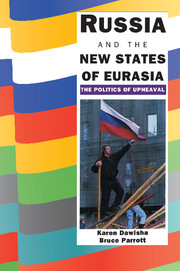Book contents
- Frontmatter
- Contents
- Preface
- Maps
- Introduction
- 1 The Legacies of History
- 2 National Identity and Ethnicity
- 3 The Impact of Religion
- 4 Political Culture and Civil Society
- 5 The Impact of Economics
- 6 Foreign Policy Priorities and Institutions
- 7 Military Issues
- 8 The Nuclear Factor
- Conclusion
- Appendix A Chronology of Events, January 1992 to October 1993
- Appendix B Compendium of Leadership and Institutional Changes in the Eurasian States, January 1992 to October 1993
- Appendix C Soviet Census Data, Union Republic and ASSR, 1989
- Notes
- Index
6 - Foreign Policy Priorities and Institutions
Published online by Cambridge University Press: 06 July 2010
- Frontmatter
- Contents
- Preface
- Maps
- Introduction
- 1 The Legacies of History
- 2 National Identity and Ethnicity
- 3 The Impact of Religion
- 4 Political Culture and Civil Society
- 5 The Impact of Economics
- 6 Foreign Policy Priorities and Institutions
- 7 Military Issues
- 8 The Nuclear Factor
- Conclusion
- Appendix A Chronology of Events, January 1992 to October 1993
- Appendix B Compendium of Leadership and Institutional Changes in the Eurasian States, January 1992 to October 1993
- Appendix C Soviet Census Data, Union Republic and ASSR, 1989
- Notes
- Index
Summary
Decision-making never occurs in a vacuum. In stable democracies, foreign policy is the end result of a process by which historical memories, contemporary pressures, and domestic political life are sorted out and turned into policy. The interests upon which a state's leaders forge foreign policy are subject to differing interpretations and misinterpretations in even the calmest of environments: The turbulence gripping the new states of the former Soviet Union has further complicated this critical task.
Struggling to define their nations’ interests, to build new institutions out of a contested past, in an environment where effective regional security structures do not exist, the leaders of the new states face almost insurmountable difficulties. They have often been forced to make foreign- policy decisions before a clear consensus on national priorities has been reached. These decisions, in turn, have had an impact on the political elites in neighboring states, who also have been taking only the first tentative steps on the international stage. For any state making the transition to independence, there are enormous pressures on its new leaders, groups, and institutions. When not just one but fifteen states are simultaneously making choices that will affect the region's total decision-making environment, the potential for a downward spiral of misperception, misinformation, and mistrust is considerable.
This potential is increased because of the fragility of the new institutions at the apex of the state structures. The leaders in all the new states have moved to assert their control over foreign policy and have often done little to overcome the widespread inexperience and lack of resources of the ministries of foreign affairs.
- Type
- Chapter
- Information
- Russia and the New States of EurasiaThe Politics of Upheaval, pp. 195 - 230Publisher: Cambridge University PressPrint publication year: 1994



